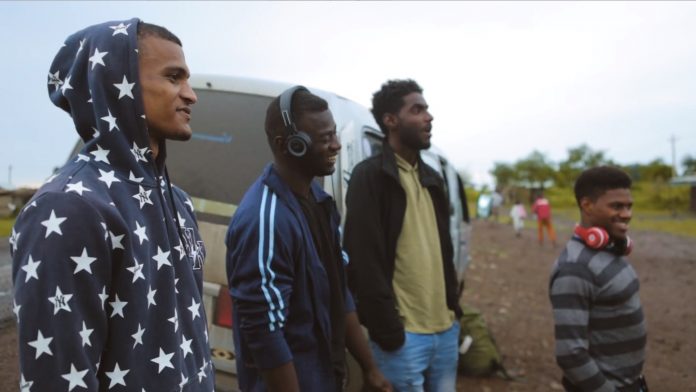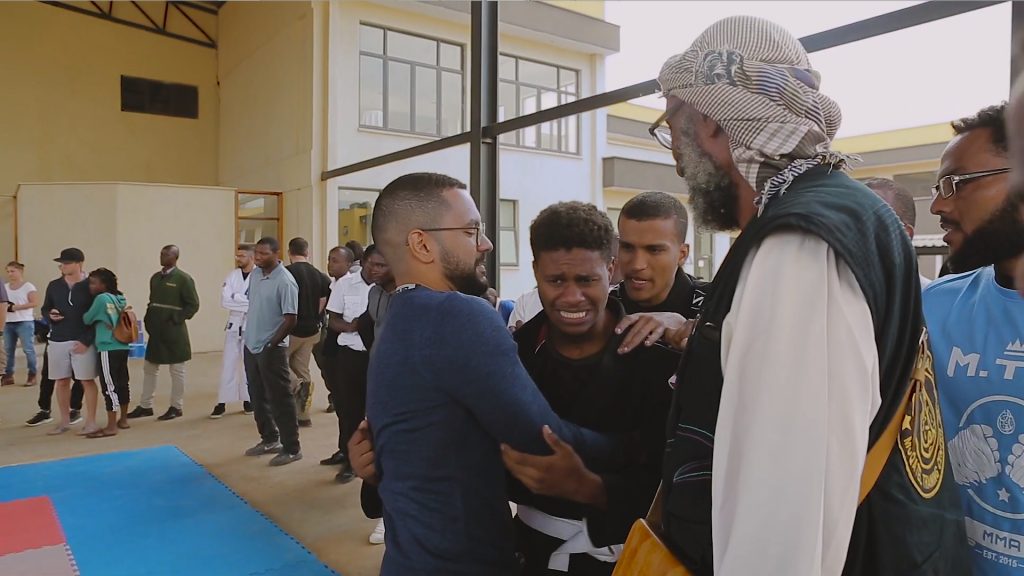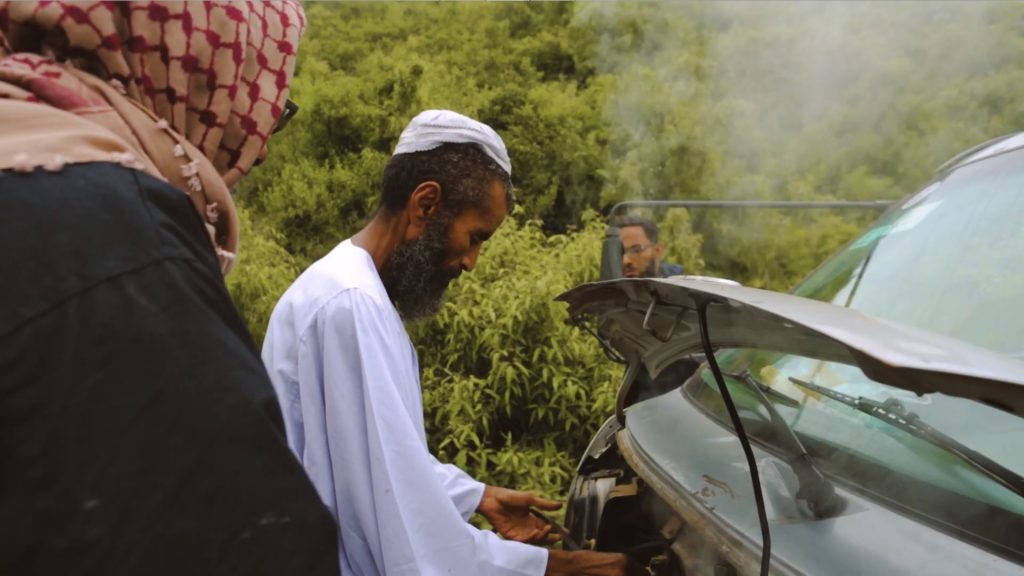
How much have you traveled to a competing BJJ tournament? Most grapplers that compete have no trouble traveling great distances just to participate in open type Jiu-JItsu tournaments. However, would you travel the same distance in a van, across the continent of Africa, just so you could compete in a JIu-JItsu tournament? I guess you would if you are a part of the Sudanese BJJ team that had their sights set on competing, despite massive obstacles. Now, a BJJ documentary called Journey To Kenya” covers the entirety of their hugely impressive adventure.
Nowadays, there are plenty of BJJ movies, whether documentaries, TV series or even Holywood flicks to feast on. Something to do, I guess, while the world is in hiding. Anyhow, a brand new BJ Jdocumentary is about to get released, and I have a feeling it will be a very emotional and powerful one. The story it covers is a well known one. Even with the facts that we know about the Sudanese BJJ team’s journey to Kenya the story was incredible. However, this full-length movie will shed even more light on the things they had to overcome to fulfill their dream.
An Impressive Story
As far as the story of the Sudanese BJJ team goes, it all starts with a group of 7 grapplers from Sudan who decided to compete at the Nairobi open in August of 2019. Nothing too unusual about it. Apart from the fact that there are 1,740 miles of rough terrain that is extremely dangerous and volatile. Oh, and there’s no option to fly, just drive for days in order to arrive at the tournament.
The man behind the idea was Mohammed Al-Munir, a then-purple belt who teaches Jiu-Jitsu at the Muqatekl training Center in Sudan. The 6 guys in his team were all blue and white belts. The team was not new to competing, with a few previous successful performances in international tournaments. However, there are other factors to consider, given the geopolitical situation in the area of the world where they live and train.

Thanks to a fundraiser, organized by the LionHeartInitiatiove, the athletes were able to receive a boost in the form of $3000 to facilitate the journey. Speaking of the journey, the details are depicted in the upcoming BJJ documentary, but in short, it took 6 days in a van across Africa for the team to arrive in Nairobi. Moreover, they were barely in time for the tournament.
“Journey to Kenya” A Full Feature BJJ Documentary
The “Journey to Kenya” BJJ documentary takes us through the incredible endeavor of the 7-man BJJ team from Sudan. The destination, Nairobi, 1740 miles away, meant they had to drive across Africa, through dangerous and hard to navigate the terrain. Of course, the journey was far from trouble-free, with the van breaking down, the team getting lost, lack of sleep, etc making things even more difficult for the enthusiastic grapplers.

The movie will show life in the MuqatelTrainin Center in Sudan, which is the only BJJ and MMA gym in the country. In just four years, the gym has around 150 active members and some of them are completely dedicated to JIu-JItsu. In fact, the team can be seen training extremely hard in the documentary, in preparation for their epic 2019 Nairobi Open performance.
The trip itself is another crazy story. In a 12-man team, two seats were reserved just for the gear the team had to carry. A trip expected to last two days ended up stretching to almost a week. Getting lost in the mountains of Ethiopia, encountering visa issues, the van breaking down are just some of the challenges they faced on the road. Not to mention having to “sleep” in a van for five nights, and barely eat anything.
The director of the movie traveled with the team and claims that it the movie managed to capture about a quarter of what really happened. You can imagine how hard it was for the team to compete if the people shooting the movie couldn’t manage to do so because of the hardships during the trip.
The LionHeart Initiative
The LionHeart Initiative, to an extent, made the entire journey possible, as we ll as the BJ Jdocumentary that followed. The initiative focuses on using martial arts to build positive social structures in undeveloped African areas. Moreover, they strive to help improve the economic situation by introducing professional martial arts into the communities. Suffice to say, the initiative’s efforts are worth recognizing, as are their results.
The LionHeart Initiative uses mainly MMA to help children from poor areas escape a life of crime. Since 2013, the initiative has done massive amounts for the rise of MMA in Africa and is continuing to go strong. Some of their projects include organizing competitions, seminars, and hosting fundraisers to help teams accomplish their goals, much like in the case of the Sudanese BJJ team.
Final Thoughts
“Journey to Kenya” was not intended for release quite so soon, but the COVID-19 pandemic has spurred the director to do so ahead of plans. The BJJ documentary, which already received an award at the Sudanese Independent Film Festival is going to come at a perfect time to ease people’s minds over the current situations. After all, if the Sudanese team could overcome so many things in pursuit of their dreams, we can stay t home a couple more weeks.


![Darce Choke Encyclopedia – Origins, Mechanics and Variations [2025] BJJ, choke, Brabo, BJJ Darce Choke, D'arce Choke, Darce BJJ Choke](https://bjj-world.com/wp-content/uploads/2017/11/JungPoirierLeeYahoo-218x150.jpg)












![Slicin’ Calves Mikey Musumeci DVD Review [2025] Slicin' Calves Mikey Musumeci DVD Review](https://bjj-world.com/wp-content/uploads/2025/04/slicin-calves-mikey-musumeci-dvd-review-218x150.png)
![Jiu-Jitsu For Old Guys Guard Retention Bernardo Faria DVD Review [2025] Jiu-Jitsu For Old Guys Guard Retention Bernardo Faria DVD Review](https://bjj-world.com/wp-content/uploads/2025/03/old-guys-guard-retention-bernardo-faria-dvd-review-218x150.png)
![X-Guard Trickery Kyle Sleeman DVD Review [2025] X-Guard Trickery Kyle Sleeman DVD Review](https://bjj-world.com/wp-content/uploads/2025/03/x-guard-trickery-kyle-sleeman-dvd-review-218x150.png)
![Countering with Crab Ride Anthony Budion DVD Review [2025] Countering with Crab Ride Anthony Budion DVD Review](https://bjj-world.com/wp-content/uploads/2025/03/countering-with-crab-ride-anthony-budion-dvd-review-218x150.png)

![Eoghan O’Flanagan Bundle Down Right Sloppy Jiu-Jitsu Review [2024] Eoghan O'Flanagan Bundle Down Right Sloppy Jiu-Jitsu Review 2024](https://bjj-world.com/wp-content/uploads/2024/09/down-right-sloppy-jiu-jitsu-eoghan-oflanagan-bundle-100x70.png)
![Shin to Shin Eoghan O’Flanagan DVD Review [2025] Shin to Shin Eoghan O'Flanagan DVD Review](https://bjj-world.com/wp-content/uploads/2024/12/shin-to-shin-eoghan-oflanagan-dvd-review-100x70.png)

![Lockdown Quickstart Guide Cameron Mellott DVD Review [2025] Lockdown Quickstart Guide Cameron Mellott DVD Review](https://bjj-world.com/wp-content/uploads/2025/03/lockdown-quickstart-guide-cameron-mellott-dvd-review-100x70.png)
![Tricks for Unstoppable Takedowns Georges St Pierre DVD Review [2024] Tricks for Unstoppable Takedowns Georges St Pierre DVD Review](https://bjj-world.com/wp-content/uploads/2024/12/unstoppable-takedowns-georges-st-pierre-dvd-review-100x70.png)


![Dima Murovanni Kill The Collar Tie BJJ Trendsetters DVD Review [2024] Dima Murovanni Kill The Collar Tie BJJ Trendsetters DVD Review](https://bjj-world.com/wp-content/uploads/2024/09/dima-murovanni-kill-the-collar-tie-dvd-review-100x70.png)
![Spider and Lasso Guard Jared Welman DVD Review [2025] Spider and Lasso Guard Jared Welman DVD Review](https://bjj-world.com/wp-content/uploads/2025/01/spider-and-lasso-guard-jared-welman-dvd-review-100x70.png)
![Master The Move The American Lock John Danaher DVD Review [2024] Master The Move The American Lock John Danaher DVD Review](https://bjj-world.com/wp-content/uploads/2024/12/the-american-lock-john-danaher-dvd-review-100x70.png)
![Henry Akins Black Hole No-Gi Closed Guard DVD Review [2024] Henry Akins Black Hole No-Gi Closed Guard DVD Review](https://bjj-world.com/wp-content/uploads/2024/09/henry-akins-black-hole-no-gi-closed-guard-dvd-review-100x70.png)
![Countering with Crab Ride Anthony Budion DVD Review [2025] Countering with Crab Ride Anthony Budion DVD Review](https://bjj-world.com/wp-content/uploads/2025/03/countering-with-crab-ride-anthony-budion-dvd-review-100x70.png)



![Slip N Slide Into Victory Julián Espinosa DVD Review [2025] Slip N Slide Into Victory Julián Espinosa DVD Review](https://bjj-world.com/wp-content/uploads/2025/01/slip-n-slide-into-victory-julian-espinosa-dvd-review-100x70.png)
![Special K Guard Neil Melanson DVD Review [2025] Special K Guard Neil Melanson DVD Review](https://bjj-world.com/wp-content/uploads/2025/03/special-k-guard-neil-melanson-dvd-review-100x70.png)

![Crush The Guard Vagner Rocha DVD Review [2024] Crush The Guard Vagner Rocha DVD Review](https://bjj-world.com/wp-content/uploads/2024/10/crush-the-guard-vagner-rocha-dvd-review-100x70.png)
![Shoulder Lock Mastery Zach Green DVD Review [2025] Shoulder Lock Mastery Zach Green DVD Review](https://bjj-world.com/wp-content/uploads/2024/12/shoulder-lock-mastery-zach-green-dvd-review-100x70.png)
![Upper Body Chain Attacks Janine Mocaiber DVD Review [2025] Upper Body Chain Attacks Janine Mocaiber DVD Review](https://bjj-world.com/wp-content/uploads/2025/03/upper-body-chain-attacks-janine-mocaiber-dvd-review-100x70.png)
![Xanadu Back Takes Levi Jones-Leary DVD Review [2025] Xanadu Back Takes Levi Jones-Leary DVD Review](https://bjj-world.com/wp-content/uploads/2025/03/xanadu-back-takes-levi-jones-leary-dvd-review-100x70.png)

![Edging Yourself Out Of Danger Craig Jones DVD Review [2024] Edging Yourself Out Of Danger Craig Jones DVD Review](https://bjj-world.com/wp-content/uploads/2024/12/edging-yourself-out-of-danger-craig-jones-dvd-review-100x70.png)
![Trip Throw Dilemma Michael Pixley and Heath Pedigo DVD Review [2024] Trip Throw Dilemma Michael Pixley and Heath Pedigo DVD Review](https://bjj-world.com/wp-content/uploads/2024/10/trip-throw-dilemma-michael-pixley-dvd-review-100x70.png)
![The Bear Trap Nicolas Renier DVD Review [2025] The Bear Trap Nicolas Renier DVD Review](https://bjj-world.com/wp-content/uploads/2025/01/the-bear-trap-nicolas-renier-dvd-review-100x70.png)
